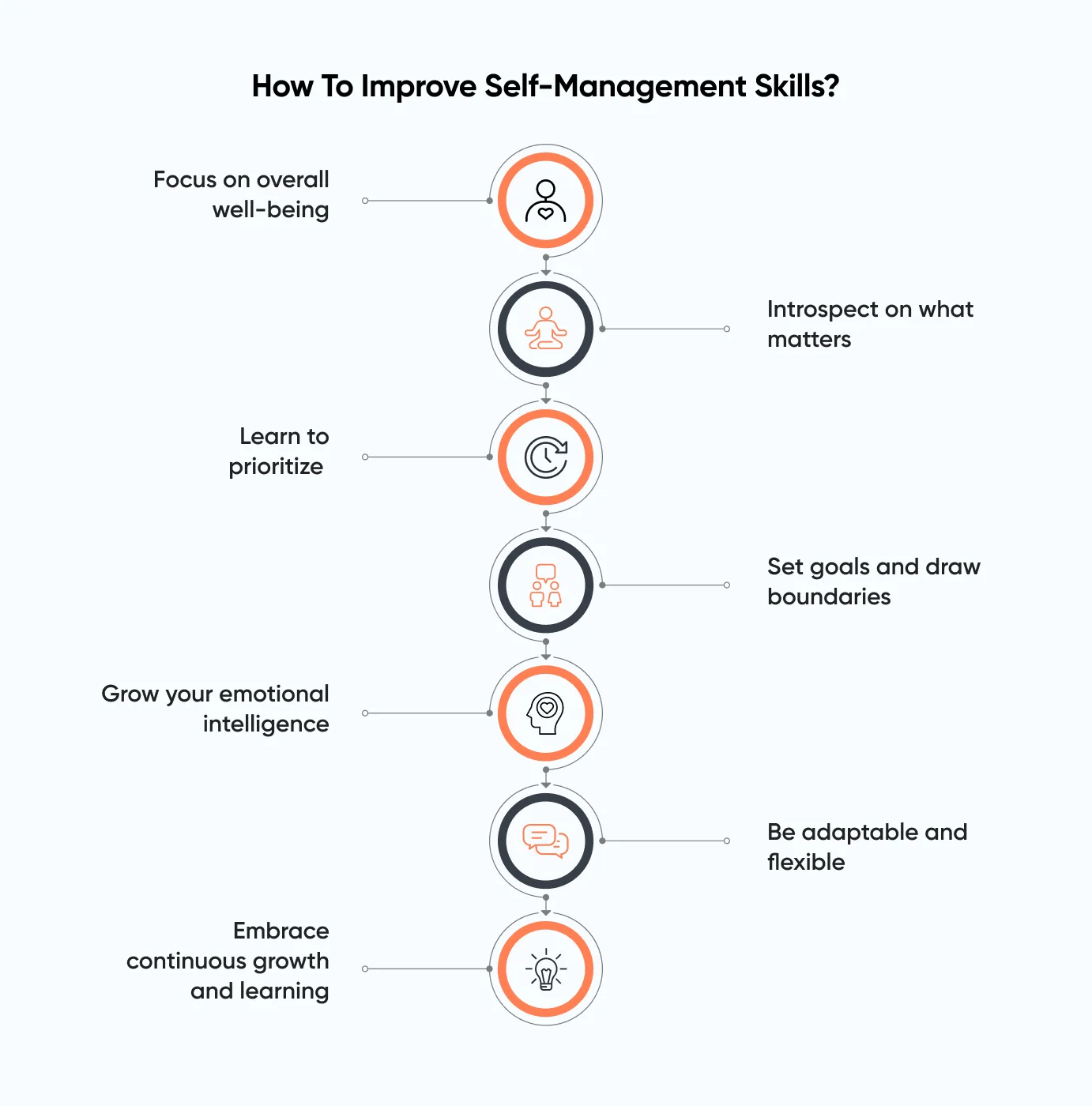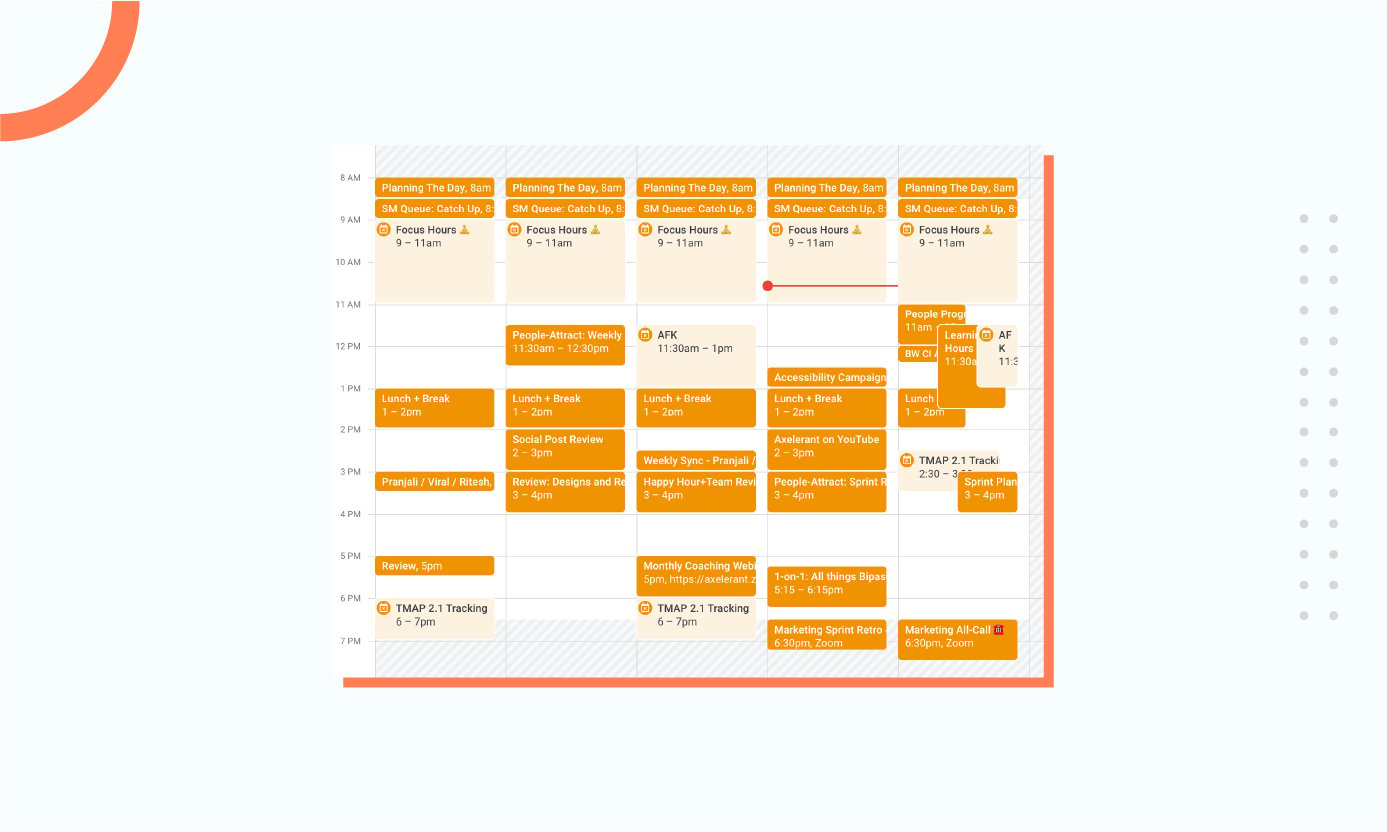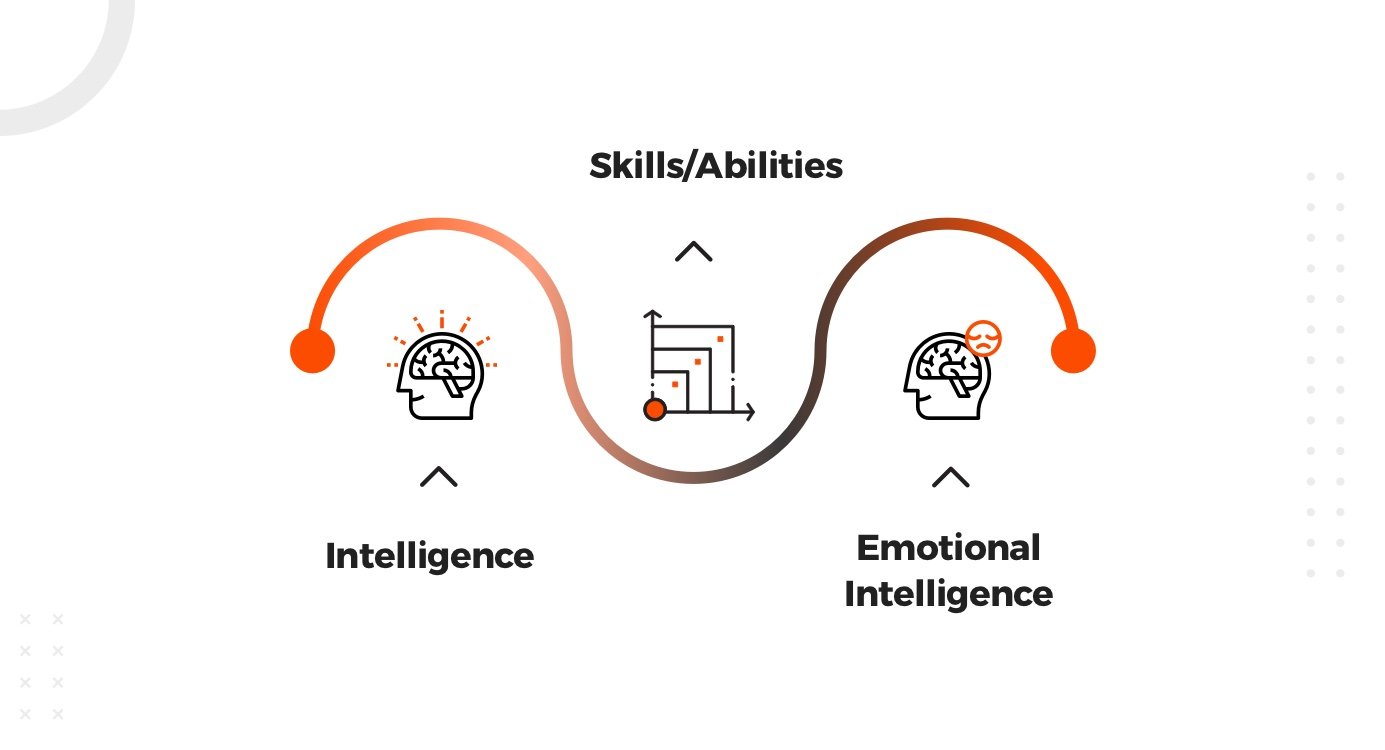Introduction
This article explains what is self-management and why it’s important, and shares tips and strategies to get better at self-management, especially at work.
We all have dreams and obligations we’d like to achieve.
But it's not as easy as our initial thoughts convince us to be.
Many elements stand between where we are and where we want to be.
But none, perhaps, more powerfully so than our own selves—our self-doubts, fears, negative dialogues, and limiting thought patterns.
That's why it's so essential to learn how to manage this self, which often stops us from doing the things we were born to do.
- What is self-management?
- Why is self-management important at work?
- Tips and strategies to improve self-management skills
What Is Self-Management?
Self-management is the ability to manage and control oneself through various skills and behaviors.
In short, you can get yourself to do what you should do and when you should do it—even when you don’t feel like it.
Self-management involves:
- Setting priorities
- Managing time effectively
- Maintaining emotional stability
- Making informed decisions
You proactively control your time, priorities, and actions—so that you can make conscious choices that align with your values and objectives.
A person is able to stay organized, overcome procrastination, and show resilience when facing challenges by getting good at self-management.
Why Is Self-Management Important At Work?
In terms of importance and time investment, work is a big part of life (not the totality of it, though).
Practicing self-management has the same effect on work as on life beyond it.
Here are four major reasons why self-management is important for you, especially at work:
- Increases efficiency and productivity: It helps you stay on track, organized, and productive with manageable stress levels.
A self-managed individual plans their day strategically, allocates sufficient time to each task, and avoids procrastination. - Promotes professionalism and reliability: People who practice self-management demonstrate punctuality, meet deadlines consistently, and take ownership of their work, earning trust and respect from colleagues.
- Prevents burnout: Effective self-management includes techniques for managing stress, such as prioritizing tasks, setting boundaries, and practicing self-care.
These techniques enable people to maintain a healthy work-life balance and address stressors proactively. - Boosts career development: Self-managed teammates are often perceived as proactive and driven because they can consistently deliver high-quality work, demonstrate initiative, and seek opportunities for growth and development that align with their own goals.

Tips And Strategies To Improve Self-Management Skills
These tips and strategies will help you practice and improve your self-management skills so that you can take charge of your life and career.

Focus On Overall Well-Being
When life gets stressful, people often suspend activities and habits that enhance their well-being.
No more fooling around, we say to ourselves. And double down on constantly worrying about our stressors—falling into this vicious cycle.
Tough, stressful situations demand more effort to realize that these are precisely when we should focus on our health.
Because with a healthy, happy, functioning mind and body, we are always better prepared to deal with stress.
Here are four tips to increase your well-being:
- Establish healthy lifestyle habits: Regularly exercise for at least 20 minutes, get adequate sleep according to your circadian rhythm (seven to eight hours), and switch to nutritious eating habits to boost physical and mental health.
- Include mindfulness practices: Introduce mindfulness techniques—meditation, deep breathing exercises, yoga, etc.—into your daily life to reduce stress and enhance focus and clarity.
Start small, five to 10 minutes initially, and work your way up. - Seek support when you need help: Sometimes, you just need people to listen to you, like friends and family.
But when that's not enough, you may need professional help from counselors or therapists. Get that help because you and your health are worth it. - Learn stress management techniques: There are many ways to manage stress, including mindfulness practices.
Harvard Health recommends trying out these. You can also take up journaling, practicing gratitude, or engaging in hobbies that bring joy and relaxation.
Introspect On What Matters
Introspection is the act of examining one's actions, behaviors, thoughts, feelings, goals, and motives.
We are bombarded with situations and questions at work that need self-reflection.
Introspection helps us understand the "why" behind what we do or want to do.
Daily inner reflection will give you clarity on your priorities and values, which in turn will help you make decisions faster.
It can also help you discover improvement areas to reach where you want.
Here are some ways to introspect at work:
- Regular journaling: Set aside time each week to journal your thoughts, feelings, and insights about your professional experiences, accomplishments, challenges.
- Seeking feedback: Actively seek feedback from colleagues, mentors, and supervisors about your performance, communication style, strengths, and areas for development.
Remember, you don't have to accept all feedback at face value.
Acknowledge, reflect, and select feedback that will genuinely help you improve. - Goal setting and review: Regularly set short-term and long-term goals for your professional growth and development.
Periodically review your progress towards these goals, reassess your priorities, and adjust your action plans as needed.
This process of goal setting and review can help you stay focused, motivated, and aligned with your objectives.
Learn To Prioritize
You need to prioritize your work based on what's important to you and your organization.
This strategic approach will let you focus on activities that add the most value and impact.
And help you manage your workload and time effectively.
Here are three prioritization strategies you can use directly or as inspiration to create something that works for you:
- Use the Eisenhower Matrix: Divide tasks into four quadrants: urgent and important, important but not urgent, urgent but not important, and neither urgent nor important.
Focus on addressing tasks in the first quadrant first, followed by the second, and so on - Effective time management: Start by estimating time for each task. Allocate specific time slots for different tasks or categories of work: focused work, meetings, breaks, daily collaborations, etc.
This way, you can ensure that critical tasks receive attention and minimize the risk of procrastination. - Try the Pareto Principle (80/20 Rule): Identify the vital few tasks that contribute the most to your objectives—typically around 20%—and concentrate on completing them first.
Focusing on the critical few tasks that yield the most substantial results maximizes productivity and ensures that your time is allocated efficiently.

Set Goals And Draw Boundaries
Setting goals is crucial for professional growth and self-management.
And it's the first step to focusing your time, energy, and efforts in the right direction.
Here are four strategies to set goals that work for you:
- Identify what success looks like for you: In most cases, your KPIs (key performance indicators) will be the primary expectations from your role to measure success.
If that's unavailable, you need to identify which success metrics apply to you with your supervisor. - Create your goals: Identify specific, measurable, and achievable objectives that you want to accomplish within a defined timeframe in your role.
Keep things realistic—remember, you impress others by achieving goals and not by setting them, no matter how big. - Choose your action items: The "how" behind achieving your objectives depends on certain action items.
These will be the roadmap towards your identified goals.
For instance, if you want to take up a certification course to become an EXIN Agile Scrum Master, you'd need to divide and allocate the total hours needed to complete the course on your calendar. - Draw boundaries: Once your roadmap is ready, say "no" to things that don't align with your goals.
You must establish boundaries to maintain a healthy work-life balance and prevent burnout.
Grow Your Emotional Intelligence
Emotional intelligence, also known as emotional quotient (EQ), is a skill set that involves recognizing, understanding, and managing your emotions and those of others.
It demands a range of abilities, such as self-awareness, self-regulation, empathy, and social skills.
A person's level of emotional intelligence has been shown to dictate their ability to learn and grow, form meaningful relationships with colleagues, clients, and stakeholders, and influence team dynamics for the better.
That's why employers see EQ as a top leadership skill and deciding factor for hiring.
If you want to succeed in your professional journey, you must consciously put effort into growing your emotional intelligence.

Be Adaptable And Flexible
Given how fast things are evolving (we are looking at you, AI), the ability to be adaptable and flexible can be the difference between a thriving and a stagnant career.
The ability to adjust to changing circumstances, priorities, and demands with ease and agility has always been a big part of self-management. But it's going to be even more critical in the future.
Here are four ways you can practice adaptability:
- Embrace change: Adopt a growth mindset that welcomes change as an opportunity for learning and growth rather than a setback.
Stay open-minded and flexible in your approach to new situations and challenges. - Develop resilience: There are many ways to build up resilience in life.
You can try Stoicism. Learn positive self-talk. Practice affirmations. Choose a practice that works for you and stick with it until you see results.
If you have access to supportive friends and family, you already have a support system to share your thoughts and emotions when they weigh heavy on you. - Keep your mind and work agile: Continuously assess and reassess your goals, priorities, and strategies in light of evolving circumstances.
It's easier said than done.
Yes, it does take extra time and effort. Yes, you will get your bearing right sometimes; sometimes, you will encounter more questions than clarity.
But that's good. That's what going forward looks like. - Seek clarity: Actively seek clarity from supervisors and mentors with specific questions about your doubts.
You will need it to align your way ahead with your team's objectives.
Embrace Continuous Growth And Learning
It's strange to imagine a time when people had careers with the same set of skills, doing the same type of work.
That doesn’t work anymore.
To succeed in your career, you need to be aware of changes in your industry, learn new skills, improve old ones, and practice and demonstrate people skills—in other words, you need to grow consistently.
And continuous growth requires a growth mindset.
Here's how you can start a life-long habit of growth:
- Embrace curiosity: Cultivate a sense of curiosity and wonder about your work.
Approach tasks with an open mind, seeking opportunities to learn and grow from each experience.
Ask questions, seek help, and explore new ideas and perspectives when facing challenges. - Start small: Break down your learning and development goals into manageable, bite-sized tasks or habits.
By starting small and gradually increasing the difficulty or complexity of your tasks over time, you can build momentum and maintain consistency in your learning journey. - Focus on process: Shift your focus from outcomes to processes.
Prioritize the steps and actions required to achieve your goals, and adjust your steps by evaluating what's not working.
And don’t forget to celebrate progress along the way, no matter how small. - Make learning a habit: Set aside dedicated time daily or weekly for self-study, skill development, or exploring new technologies that make you curious and are relevant to your profession.
Consistency is key to building lasting habits and driving continuous growth.

Self-management is perhaps the most complex skill to acquire in life.
It's foundational to one's ability to grow and thrive—not just at work but in every sphere.
Start your journey toward yourself with the first step: self-awareness and introspection.
You might discover the most fascinating person you've ever crossed paths with.

Rohit Ganguly, Content Marketer
Rohit is a content marketer first and a YouTuber second. He loves to interact with animals, feed them, clean his apartment, and spend time with friends and family. Curious by nature, he also enjoys literature, movies, meditation, and calligraphy.

 We respect your privacy. Your information is safe.
We respect your privacy. Your information is safe.



Leave us a comment